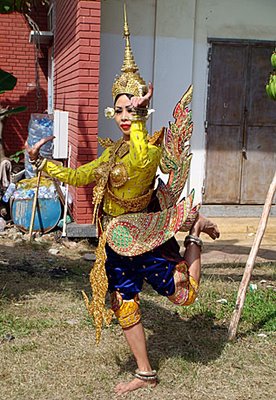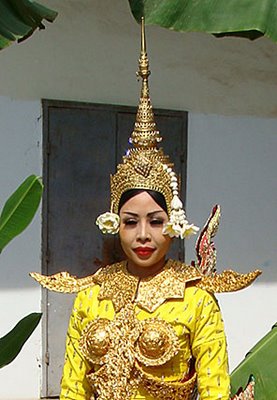Prima ballerina
Considered by all as Cambodia's finest interpreter of the female character in classical dance, Sam Sathya has been her country's prima ballerina for more than a decade and is still going strong, having appeared in the recent successful musical-opera Where Elephants Weep. She began her formal training as a classical dancer in the early 1980s, but was first exposed to performance during the Khmer Rouge regime. As a little girl it was her task to light the lamps that illuminated the performance area of the troupes that danced and sang of the glory of the revolution. By the end of the Khmer Rouge period, when she and her immediate family returned to their hometown of Phnom Penh, they had lost more than a third of their extended family to starvation and disease. As a dance student, she was selected to perform female roles from the classical repertoire, including the principal roles of Princess Sita in the Reamker, the Cambodian version of the Ramayana epic, and as Moni Mekhala, goddess of the sea. In performing these revered roles she continued a lineage passed to her by her own renowned teachers, Chea Samy and Menh Kossony. Her first departure from the classical repertory was under the guidance of Sophiline Cheam Shapiro in works that bridged the gap between Cambodian court dance and Western literature, including Pamina in Pamina Devi, a classical dance interpretation of Mozart's The Magic Flute and Desdemona in Samritechak, based on Shakespeare's Othello, both performed in the classical court form. Other leading roles in The Glass Box and Seasons of Migration were followed more recently by Where Elephants Weep though always maintaining reverence and respect for the tradition of dance. Her longevity at the pinnacle of classical dance has seen her perform around the globe, in Africa, Asia, Europe and North America and when she is back home in Phnom Penh, she teaches at the Royal University of Fine Arts dance department.
 Sam Sathya in full costume practising her art
Sam Sathya in full costume practising her art
 Sam Sathya in full costume practising her art
Sam Sathya in full costume practising her artWhilst on the subject of classical dance, Singapore-based writer Stephanie Burridge is working on a book, Beyond the Apsara: Celebrating Dance in Cambodia that is due for publication in the middle of next year. It will examine the current dance scene in Cambodia and explore its evolution in relation to years of post-war revival and preservation. The book will include chapters by many eminent writers focusing on a variety of topics, nearly thirty short essays representing the voices of young Cambodian dancers and how they view themselves in today's Cambodian society, and personal accounts by senior dance masters voicing both support for, and apprehension about Cambodia's foray into contemporary dance.



0 Comments:
Post a Comment
<< Home